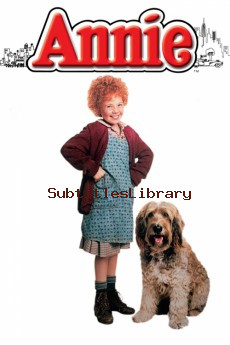Movies Listings by Genre Musical on Subtitleslibrary
-
Cast: Tim Curry, Meredith Salenger, Albert Finney, Shawnee Smith
In the depths of the 1930s, Annie (Aileen Quinn) is a fiery young orphan girl who must live in a miserable orphanage run by the tyrannical Miss Agatha Hannigan (Carol Burnett). Her seemingly hopeless situation changes dramatically when she is selected to spend a short time at the residence of the wealthy munitions industrialist, Oliver "Daddy" Warbucks (Albert Finney). Quickly, she charms the hearts of the household staff and even the seemingly cold-hearted Warbucks cannot help but learn to love this wonderful girl. He decides to help Annie find her long-lost parents by offering a reward if they would come to him and prove their identity. However, Miss Agatha Hannigan, her evil brother, Daniel Francis "Rooster" Hannigan (Tim Curry), and a female accomplice, plan to impersonate those people to get the reward for themselves, which puts Annie in great danger. ?Kenneth Chisholm
-
Cast: Jim Cummings, Tress MacNeille, Frank Welker, Maurice LaMarche
Parisian screw-up urchins Mickey, Donald, and Goofy can barely keep out of trouble for a day, but since gallant musketeer saved Mickey and gave him his plumed hat as a token they may one day join the glorious French royal elite regiment, they dream of enlisting. Guards captain Peg-leg, who dreams of usurping the throne, cruelly laughs them away as butterfingers midgets of no use. yet, when haughty Minnie, whom he needs to wed to legitimate his coup, demands her own bodyguard, which mighty actually protect her, he decides to enlist and propose the bumbling trio, confident he and masked accomplices can easily eliminate and blame those. ?KGF Vissers
-
Cast: Oliver Hardy, Ellen Corby, Charlotte Henry, Marie Wilson
Ollie Dee and Stanley Dum try to borrow money from their employer, the toymaker, to pay off the mortgage on Mother Peep's shoe and keep it and Little Bo Peep from the clutches of the evil Barnaby. When that fails, they trick Barnaby into marrying Stanley Dum instead of Bo Peep. Enraged, Barnaby unleashes the bogeymen from their caverns to destroy Toyland. ?Paul Penna
-
Cast: Emily Browning, Hannah Murray, Sarah Swire, Pierre Boulanger
Set in Glasgow, Scotland, the film is about a girl called Eve who is in the hospital dealing with some emotional problems and starts writing songs as a way of getting better. Songwriting becomes her way forward, leading her to the City where she meets James and Cassie, two musicians each at crossroads of their own. What follows is a story of renaissance over the course of a long, dream-like Summer. ?bcm
-
Cast: Alice Cooper, Meat Loaf, Kurtwood Smith, Richard Portnow
Down home Texas boy Travis W. Redfish falls hard for Lola Bouilliabase, a glitter-spangled groupie determined to lose her virginity to Alice Cooper. Hoping to woo her, Travis signs with a travelling rock band and soon finds himself celebrated as the greatest roadie of all time. Between concerts, Travis uses his wits to make sure that the show goes on, no matter where, no matter what. This does not take long for Travis to realize that, compared to the great rock circus, there's no place like home. However, Lola's date with destiny (and Cooper) to become the greatest groupie of all time looms. Can true love survive rock 'n' roll? ?MGM/UA Home Video
-
Cast: Vera-Ellen, Betty Garrett, Frank Sinatra, Gene Kelly
Three sailors - Gabey, Chip and Ozzie - let loose on a 24-hour pass in New York and the Big Apple will never be the same! Gabey falls head over heels for "Miss Turnstiles of the Month" (he thinks she's a high society deb when she's really a 'cooch dancer at Coney Island); innocent Chip gets highjacked (literally) by a lady cab driver; and Ozzie becomes the object of interest of a gorgeous anthropologist who thinks he's the perfect example of a "prehistoric man". Wonderful music and terrific shots of New York at its best. ?A.L.Beneteau
-
Cast: Jean Louisa Kelly, Joey McIntyre, Tony Cox, Joel Grey
Two teenagers on neighboring farms steal glances and hide their romance from their feuding fathers. However, the fathers are actually good friends who have hatched a plan--with help from a mystical roving sideshow and its equally-mysterious ringmaster--to get the two lovebirds down the aisle. But in order to bring these families together, they must first be torn apart. ?Anonymous
-
Cast: Howard Da Silva, Blythe Danner, William Daniels, Donald Madden
The film version of the Broadway musical comedy of the same name. In the days leading up to July 4, 1776, Continental Congressmen John Adams and Benjamin Franklin coerce Thomas Jefferson into writing the Declaration of Independence as a delaying tactic as they try to persuade the American colonies to support a resolution on independence. As George Washington sends depressing messages describing one military disaster after another, the businessmen, landowners and slave holders in Congress all stand in the way of the Declaration, and a single "nay" vote will forever end the question of independence. Large portions of spoken and sung dialog are taken directly from the letters and memoirs of the actual participants. ?Dave Heston
-
Cast: Shirley Jones, Dolores Michaels, Jeanette Nolan, Pat Boone
Chicagoan Nick Conover received a suspended sentence for being caught joyriding in a stolen car, with his driver's license suspended indefinitely. Nicky's problems are seen as running around with the wrong crowd. Nicky's sentence is predicated on him living at the run down Kentucky horse farm of his Aunt Henrietta and Uncle Jed Bruce, who he hasn't seen since he was a child. The judge figured this more wholesome environment would get Nicky away from his bad influences. Henrietta wants to be a part of Nicky's salvation, but Jed doesn't trust the fact of a delinquent being under his roof, although he has other more personal reasons not having to do with Nicky for his initially antagonistic relationship with his nephew. Nicky doesn't rebel against farm life, but ends up gravitating toward anything mechanical, especially the sports car owned by sophisticated Fran Templeton - the elder daughter of Dan Templeton, who owns the luxurious neighboring horse farm - and by association Fran herself. With his infatuation with Fran, Nicky doesn't see that Fran's younger sister, the tomboyish and horse loving Liz Templeton, hangs around him because she is falling for him. It isn't until a couple of incidents involving Jed's only remaining horse, the spirited Tugfire, occur that Nicky begins to see his uncle and Liz in a different light. But Nicky's past catching up with him may get in the way of a Nicky/Liz happy ending. ?Huggo
-
Cast: Anna Kendrick, Elizabeth Banks, Rebel Wilson, Brittany Snow
The Bellas are back, and they are better than ever. After being humiliated in front of none other than the President of the United States of America, the Bellas are taken out of the Aca-Circuit. In order to clear their name and regain their status, the Bellas take on a seemingly impossible task: winning an International competition no American team has ever won. In order to accomplish this monumental task, they need to strengthen the bonds of friendship and sisterhood, and blow away the competition with their amazing aca-magic! With all new friends and old rivals tagging along for the trip, the Bellas can hopefully accomplish their dreams once again. ?Chris Greenleaf
-
Cast: Matthew Gray Gubler, Jason Lee, Jane Lynch, Justin Long
In a tree farm, three musically inclined chipmunks, Alvin, Simon and Theodore, find their tree cut down and sent to Los Angeles. Once there, they meet the frustrated songwriter David Seville, and despite a poor house wrecking first impression, they impress him with their singing talent. Seeing the opportunity for success, both human and chipmunks make a pact for them to sing his songs. While that ambition proves a frustrating struggle with the difficult trio, the dream does come true after all. However, that success presents its own trials as their unscrupulous record executive, Ian Hawke, plans to break up this family to exploit the boys. Can Dave and the Chipmunks discover what they really value amid the superficial glamor around them? ?Kenneth Chisholm ([email protected])
-
Cast: Susan Sarandon, Barry Bostwick, Tim Curry, Meat Loaf
On a wild and rain-swept late-November evening, somewhere at an empty stretch of road outside Ohio's merry Denton, blissfully-affianced, prudish, boringly-innocent young pair Brad Majors (Barry Bostwick) and Janet Weiss (Susan Sarandon) find themselves stranded on their way to visit an ex-tutor. Instead, the couple will inadvertently unearth the cross-dressing Dr. Frank-N-Furter's (Tim Curry's) spooky lair of inexhaustible oddities, just in time to partake in the out-of-this-world mad scientist's proud unveiling of his latest, delightfully extravagant, most daring creation: the ultimate male and the perfect sex symbol: the flaxen-haired Rocky Horror (Peter Hinwood). But, little by little, as the effervescent transgressive force gobbles up whole the unsuspecting visitors of the night, Brad and Janet slowly begin to embrace the potent fascinations of seduction, while an idolized Rocky roams free in the mansion. Who can interrupt man's union with the absolute pleasure? ?Nick Riganas
-
Cast: Jonathan Groff, Josh Gad, Idina Menzel, Milly Shapiro
It's Anna's birthday and Elsa plans to throw her the perfect surprise party with the help of Kristoff and Olaf. However, after planning the huge party and as Anna is being led on a "party treasure hunt," Elsa finds that she has caught a cold (presumingly from the eternal winter). She starts sneezing and produces a group of small, cute snow people, much like Olaf, with each sneeze. After some near-misses, a very exhausted Elsa finally makes it with Anna to the courtyard where the party has been arranged. It is a big hit, and at last Anna manages to convince Elsa into letting her to lead her to bed and take care of her. Meanwhile, Olaf has taken the tiny snow creatures under his wing and takes them to Elsa's ice castle with the help of Kristoff. ?shuwey
-
Cast: Will Ferrell, Uma Thurman, Nathan Lane, Mel Brooks
New York, 1959. Max Bialystock was once the king of Broadway, but now all his shows close on opening night. Things turn around when he's visited by the neurotic accountant Leo Bloom, who proposes a scheme tailor-made for producers who can only make flops: raise far more money than you need, then make sure the show is despised. No one will be interested in it, so you can pocket the surplus. To this end, they produce a musical called Springtime for Hitler written by escaped Nazi Franz Liebken. Then they get the insanely flamboyant Roger De Bris to direct. Finally, they hire as a lead actress the loopy Swedish bombshell Ulla (whose last name has over 15 syllables). As opening night draws near, what can go wrong? Well, there's no accounting for taste... ?rmlohner
-
Cast: Matt Groening, Penn Jillette
Theory of Obscurity tells the story of the renegade sound and video collective known as The Residents. A story that spans 40 years and is clouded in mystery. Many details surrounding the group are secret, including the identities of its members. Our film takes viewers inside this incredibly private group with unprecedented access to their archives and their recent 40th anniversary tour. The Residents have released more than 60 albums, performed all over the world and inspired many people to be weird, take chances and find their own voice. Now, our film will introduce The Residents to a whole new generation. ?Anonymous
All images and subtitles are copyrighted to their respectful owners unless stated otherwise. This website is not associated with any external links or websites. ©subtitleslibrary.com



